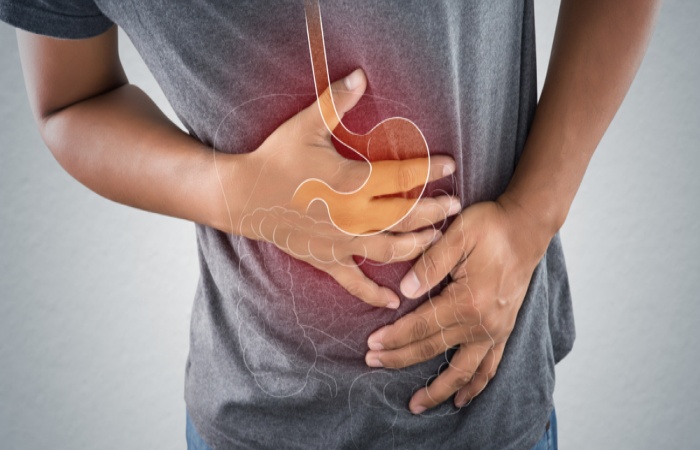Table of Contents
Introduction
A stomach ulcer is one of the diseases that occur in the stomach and is known as gastric ulcers. Stomach ulcers are a type of peptic ulcer disease; peptic ulcers are any which occurs to both the stomach and the small intestine.
Gastric or Peptic ulcer is a loss of substance from the stomach mucosa, usually round or oval in appearance, which occurs in the regions of the digestive tract that are visible to the action of acid. Fundamentally affects the stomach and duodenum.
Stomach ulcers occur when the thick layer of mucus that protects your stomach from digestive juices is reduced. This allows the gastric acids to eat away at the tissues that line the stomach, causing an ulcer.
Stomach ulcers may be quickly cured, but they can become severe without proper treatment.
What are the Causes of Stomach Ulcer?

Gastric or peptic ulcer seems due to an inequity between aggressive forces (acid) and distrustful forces (mucus barrier).
Although there are many factors that can cause this imbalance, most of the time it is caused by the presence of a germ ( Helicobacter pylori ) and by the eating of anti-inflammatory drugs. Tobacco also has a negative influence.
Symptoms of Stomach Ulcer Diseases
If one has an ulcer, they may feel a burning impression in their stomach. This burning sensation often:
- lasts a few minutes or several hours
- extras after taking antacids or ending food intake
- starts in the middle of the night or during meals
- occurs off and on for several weeks.
Some Remedies for Stomach Ulcer
Ginger
Many people think that ginger has gastroprotective effects. Some people use it to treat stomach and digestive situations, such as constipation, bloating, and gastritis.
The source advises that ginger can help with gastric ulcers caused by H. pylori germs. Consumption of ginger may also prevent ulcers caused by NSAIDs. So, it is not clear whether the things would be similar in humans.
Plantain Bananas
Plantains are a type of banana. Advises that unripe plantain may have a positive effect on peptic ulcers.
Unripe plantains cover a flavonoid called leucocyanidin. Leucocyanidin grows the amount of mucus in the stomach. This fruit may also reduce acidity, which can help prevent and relieve indicators of ulcers.
Honey
Honey is a popular, natural inducement used across the United States. People who consume honey frequently can enjoy a range of health benefits.
Source states that Manuka honey has antimicrobial effects against H. pylori. It suggests that pets could help treat stomach ulcers.
People also use honey to speed up wound healing, including skin ulcers, burns, and injuries.
Turmeric
Turmeric is a popular yellow spice often used in India and other parts of southerly Asia. Like chili peppers, turmeric contains a multiple called curcumin. Researchers are beginning to study curcumin in affections to its health benefits
The source concluded that curcumin has anti-inflammatory and antioxidant activities that may help avoid stomach ulcers. However, there are a restricted number of studies on humans.
There needs to be more explored to examine how effective turmeric is in treating ulcers. Still, initial results appear to be positive. Experts hope that turmeric can help release ulcer symptoms and treat them somehow. Are peptic ulcers diagnosed?
How is a Stomach Ulcer Diagnosed?

Your healthcare worker will look at your past health and give you a bodily exam. You may also have some tests.
Imaging tests used to diagnose ulcers include
Gas transactional series or barium swallow. This test looks at the tissues of the top part of your digestive system. It checks your food pipe, stomach, and the first part of the small intestine. You resolve to swallow a metallic fluid called barium. Barium coats the tissues so that they can be seen on an X-ray.
The Following Lab Tests
Blood tests. These check for infection-fighting cells (antibodies) that mean you have H. pylori.
Bench nation. A small example of your stool is composed and guided to a lab. The test resolves display in 2 or 3 days if you have H. pylori.
Urea breath test. This orders to see how much carbon dioxide is in your smell when you exhale. You will mouthful a urea pill that has carbon particles. If you have H. pylori, the urea will cause disruption down and become carbon dioxide. You will have an example of your breath by breathing into a bag. It will be sent to a lab. If your selection shows higher than average amounts of carbon dioxide,
Conclusion
Stomach ulcers happen when the acids that help you digest food injure the stomach or duodenum walls. The most shared cause is poison with a bacterium called Helicobacter pylori. The different rationale is the long-term use of nonsteroidal anti-inflammatory medications (NSAIDs) such as aspirin and ibuprofen. Stress and spicy foods do not cause ulcers but can make them worse.
To see if you have an H. pylori infection, your doctor will test your blood, breath, or stool. Your doctor also may look inside your stomach and duodenum by doing an endoscopy or x-ray.
Stomach ulcers will get worse if not treated. Treatment may include medicines to decrease stomach acids or antibiotics to kill H. pylori. Antacids and milk can’t heal peptic ulcers. Not smoking and evading alcohol can help. You may need surgical treatment if your ulcers don’t heal.
